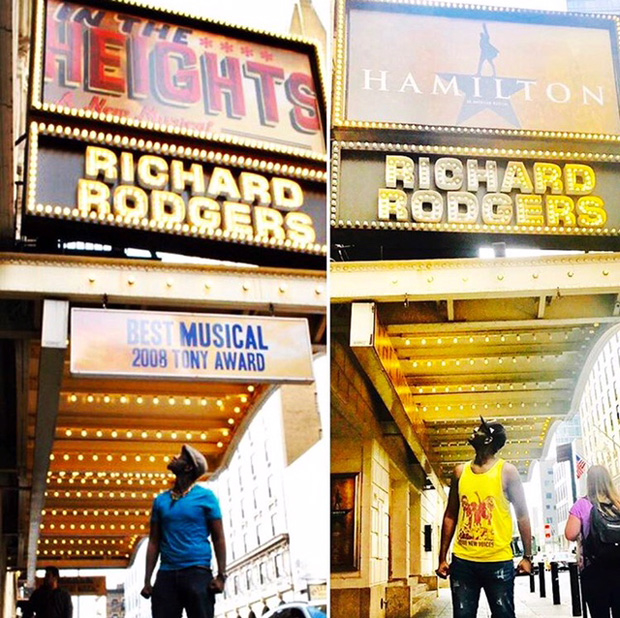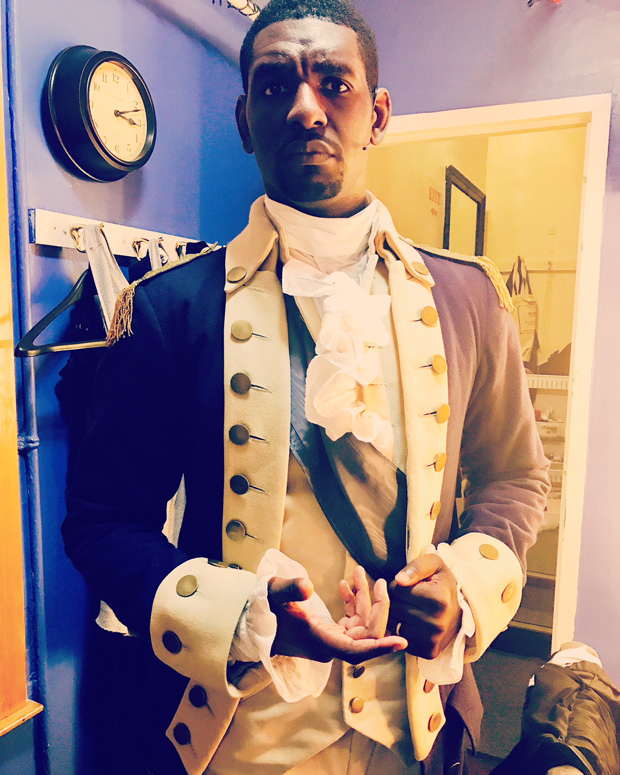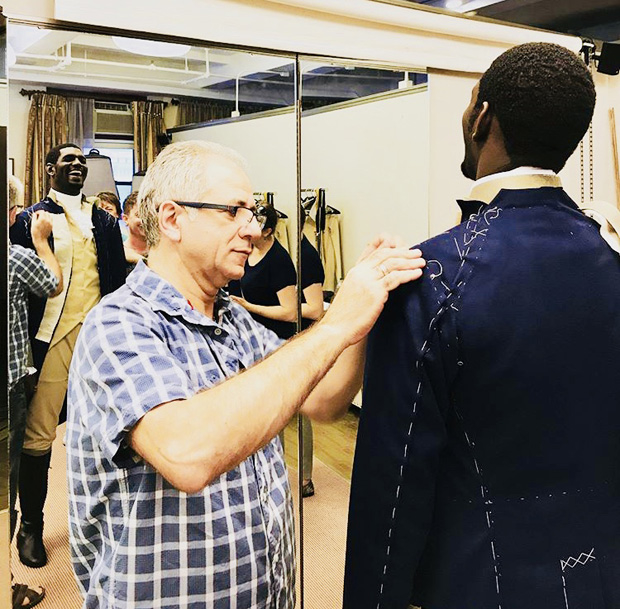Once Homeless, Carvens Lissaint Rides Out West With Hamilton

(© Carvens Lissaint)
Eight years ago, Carvens Lissaint treated the Richard Rodgers Theatre the way a pilgrim treats a holy shrine. "I was homeless at the time," he explains, "and I would perform poetry on the subway to save up money to go see In the Heights." Sometimes he had nowhere to stay, so he would ride the train from end to end all night.
In the Heights is about life in Manhattan's Washington Heights neighborhood (not far from where Lissaint grew up). It was Lin-Manuel Miranda's first Tony-winning musical, and it played the same theater as Miranda's currently running megahit Hamilton, about America's dynamo first Treasury Secretary. Lissaint was a fan of In the Heights, but he wanted to be in Hamilton.
"If they would have told me to play a doorknob in Hamilton, I would have done it," Lissaint says. That comment somewhat downplays the fact that he spent much of the past year showing up at the Rodgers eight times a week as the standby for Washington, Burr, and Lafayette/Jefferson. This month, Lissaint joins the company of the national tour to play Washington full-time. His first performance will be on April 3 at the Fabulous Fox Theatre in St. Louis, with future engagements in Houston, Atlanta, Washington, and Boston.
It has been a long struggle to this point. The son of two Haitian immigrants, Lissaint worked hard to reconcile his artistic ambitions with his parents' expectations, two things that have finally come together in Hamilton. Lissaint told us about his career as an internationally recognized poet and his circuitous path to Broadway. But first, we had to get a pressing question out of the way:

(© Carvens Lissaint)
What's the story behind your name?
According to my father, it was a mistake. I think they wanted to name me Kevin, but when you pronounce it with a thick Haitian Creole accent it sounds like "Ker-víns." He was still new to the country, so when he went to go write it, he was like, "How do I spell that? C-A-R-V-E-N-S." So growing up, they would always call me K as a nickname, because I was supposed to be Kevin, but my legal name ended up being Carvens. I don't know anyone else who has it.
They've given you an unforgettable stage name. Did you grow up in a theatrical family?
No. Not even a little bit. My parents were very strict. Everything was about school, even though I didn't function well in a traditional school setting. I had this crazy imagination, but I didn't know how to express it. I knew I could sing by kindergarten. I would listen to a Boyz II Men album during nap time, because I could never get to sleep.
How did you become a poet?
I was coaching basketball with this nonprofit, and they took us to an open-mic night hosted by another nonprofit called Urban Word NYC, which facilitates spoken-word poetry slams year-round. I was in love with hip-hop and verse. I was in love with music. This is a medium that mixes the vulnerability of R&B and the lyrical dexterity of verse. When I saw it, I knew it was what I wanted to do for the rest of my life.
So how did you end up on Broadway?
My senior year of high school I was part of a salsa dance team, and they gave us tickets to this show called In the Heights. I had seen a couple of Broadway shows before, but I wasn't really moved by them. Then I saw In the Heights and it changed my life, specifically Chris Jackson's performance. Here was this black man with a sultry R&B voice who was rapping and his girlfriend was leaving him behind to go off to college. That was me! I saw myself onstage for the first time that night, and I knew that I wanted to be in a show like that.
Did you get any pushback from your parents about your artistic pursuits?
My father forbade me from attending poetry slams. It wasn't until I got into grad school for acting that he started to accept it. I think the fact that he could say his son was at NYU helped. By then I had published a book and won national poetry slams, but it wasn't enough — and I get it: You move here from the poorest country in the western hemisphere so that, hopefully, your children can have better opportunities and financial stability. I chose a career that has no financial stability…he couldn't fathom it.
Now you're in a musical about an incredibly ambitious Caribbean immigrant who becomes the father of American capitalism. Does that resonate?
Growing up, my father would say things like, "You don't know what struggle is. I walked barefoot for miles every morning to milk goats and then to go to the market so we could have something to eat." He's from rural Haiti and he was the last of his brothers and sisters to come to America. So when I heard the words "young, scrappy, and hungry," that immediately resonated with me. I've seen my father slave at a job all day, go to college at night, and then study until 2am just to wake up four hours later and do it all again. My mom is a nurse and she would work nights. The show reflects that work ethic in the character of Hamilton, so I know it means something to them. I've seen my father cry three times in my life, and one of those times was at the stage door of the Richard Rodgers Theatre.

(© Carvens Lissaint)
What has it meant to you to be able to bring your talent as a spoken-word artist to the Broadway stage?
In acting school the professors would say, "OK, everyone choose a poem or speech of high caliber to work on." I would bring in something by Tupac, and they would say, "No, no, no…we mean Shakespeare; something that's really high art." So I spent a lot of time being told that the verse I loved wasn't valued. Hip-hop was so disregarded as a form of storytelling, which is unfortunate because it has everything you need as an actor. It's ripe for the theater. So to see that form used on such a high platform finally made me feel valued. That's what has moved me the most. You can now look at Hamilton and a Shakespeare history with the same respect.
I imagine those professors are now calling you up for tickets.
Absolutely. Absolutely. Absolutely.











